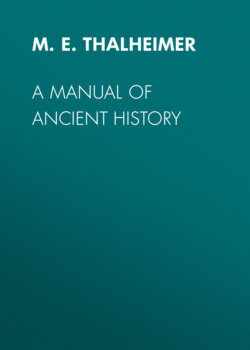Читать книгу A Manual of Ancient History - M. E. Thalheimer - Страница 32
На сайте Литреса книга снята с продажи.
RECAPITULATION.
ОглавлениеThe Phrygians, earliest settlers of Asia Minor, were active in tillage and trade, and zealous in their peculiar religion. Lydia afterward became the chief power in the peninsula. At the end of three dynasties, it had reached its greatest glory under Crœsus, when it was conquered by Cyrus, and became a province of Persia, BC 546.
The first great commercial communities in the world were the Phœnician cities, of which Sidon and Tyre were the chief; their trade extending by sea from Britain to Ceylon, and by land to the interior of three continents. Tyrian dyes, and vessels of gold, silver, bronze, and glass were celebrated. Phœnicia was subject four hundred years to the Assyrian Empire, and became independent at its fall, only to pass under the power of Necho of Egypt, and, in turn, to be subdued by Nebuchadnezzar of Babylon. Baal, Astarte, Melcarth, and the marine deities were objects of Phœnician worship.
Syria Proper was divided into five states, of which Damascus was the oldest and most important.
The Hebrew nation began its existence under the rule of Moses, who led his people forth from Egypt, and through the Arabian Desert, in a journey of forty years. Joshua conquered Palestine by the two decisive battles of Beth-horon and the waters of Merom, and divided the land among the twelve tribes. Judges ruled Israel nearly six hundred years.
Saul, being anointed as king, subdued the enemies of the Jews; but, becoming disobedient, he was slain in battle, and David became king, first of Judah, and afterward of all Israel. He made Jerusalem his capital, and extended his dominion over Syria and Moab, and eastward to the Euphrates. His sacred songs are the source of his enduring fame. Solomon inherited the kingdom, which he enriched by commerce and adorned with magnificent public works, both for sacred and secular uses. The Dedication of the Temple is the great era in Hebrew chronology. The wisdom of Solomon was widely famed, but the luxury of his court exhausted his kingdom, and on the accession of Rehoboam ten tribes revolted, only Judah and Benjamin remaining to the house of David.
Jeroboam fixed his capital at Shechem, and the shrines of his false gods at Bethel and Dan. In spite of the faithful warnings of the prophets, the kingdom of Israel became idolatrous. The nineteen kings who ruled BC 975–721 belonged to nine different families. Ahab and Jezebel persecuted true believers and established Tyrian idolatry; but their race was exterminated and Jehu became king. The Ten Tribes reached their greatest power and wealth under Jeroboam II. In the reign of Menahem they became subject to Pul, of Chaldæa. A revolt of Hoshea against Assyria led to the capture of Samaria, and the captivity of both king and people.
The kingdom of Judah, with a smaller territory, had a people more united in faith and loyalty, and was ruled four hundred years by descendants of David. Jehoshaphat made a close alliance with Ahab, which brought many calamities upon Judah. In the reign of Jehoram, Jerusalem was taken by Arabs and Philistines; and after the death of Ahaziah, Athaliah, daughter of Jezebel, usurped the throne. Joash, her grandson, was protected and crowned by Jehoiada, the high priest. The prosperity of Judah was restored by the conquests and efficient policy of Azariah. Ahaz became tributary to Tiglath-pileser, of Assyria, and degraded his kingdom with idolatry. Hezekiah resisted both the religion and the supremacy of the heathen. Manasseh was carried captive to Babylon, and on his return reformed his administration. Josiah cleansed the land from marks of idolatry, rebuilt the Temple, discovered the Book of the Law, and renewed the celebration of the Passover. The Scythians invaded Palestine. Josiah was slain in the battle of Megiddo, and his sons became vassals of Egypt. Nebuchadnezzar subdued both Egypt and Palestine, captured Jerusalem, and transported two successive kings and the mass of the people to Babylon.
